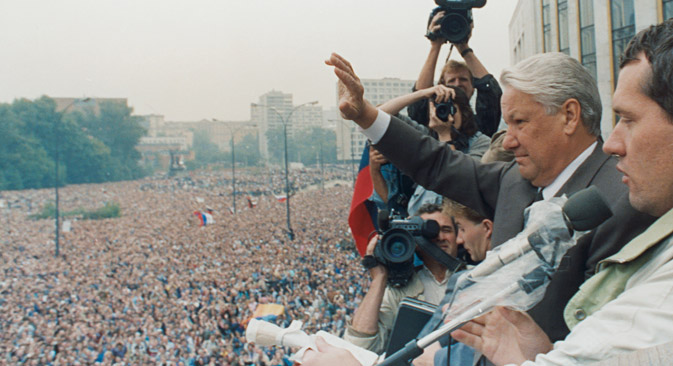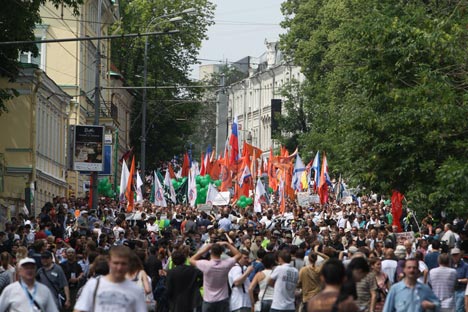
Despite some analysts dubbing his presidency as the time of a real democratic experiment in Russia, Yeltsin was severely criticized for being too authoritarian. Source: Reuters
While taking stock of the quarter-century-long construction process of the Russian state which emerged after the USSR fell, analysts are of the view that the new Russian state has succeeded, but there are several serious challenges which it still has to face.
Speaking of post-Soviet Russia, analysts tend to believe that, in its main aspects, the new Russian state has stood the test of time. However, they also note its contradictory character.
According to some observers, this is because of the ambiguity in adopting the document on the sovereignty of Russia in the framework of the Soviet Union, because the Russian Federation was the main supporting structure of the Union which ceased to exist in December 1991.
“The final nail”
“The very declaration is a very contradictory phenomenon. On the one hand, it predetermined the collapse of the USSR, and on the other, it preserved the territory of the Russian Federation”, Dmitriy Andreev, political analyst and deputy chief editor of the anthology ‘The development and the economy,’ told RIR.
The Declaration of State Sovereignty of the RSFSR was adopted by the First Congress of People's Deputies on June 12, 1990. The document stated the “determination to create a democratic state of law within the renewed Soviet Union.” The Declaration established the supremacy of the constitution and laws of the republic on the territory of the RSFSR and confirmed the right of free secession from the USSR.
He believes that the declaration of Russian sovereignty became “the last nail in the coffin of the Soviet Union”. However, it was the only possible scenario, and it was “the best of the worst options”, since possibilities to preserve the integrity of the country had been missed.
Boris Shmelev, head of the Centre for Political Studies at the Institute of Economics, said, “By initiating the collapse of the Soviet Union, the Russian nation actually renounced a part of itself,” because “the Soviet Union also represented a great historical Russia.”
Unstable statehood
According to Shmelev, while Russia has managed to create institutions of governance and civil society, and to establish an economic system over the past 25 years, the Russian state has not acquired the necessary stability during this period. This is largely due to the fact that Russia has not yet managed to build an effective democratic political system, he felt.
“What we have is a soft but nevertheless authoritarian regime. We have not developed a system of checks and balances. Parliament is not working, it is just a voting machine; there is no stable party system; a lot of corruption...” Shmelev said, outlining his understanding of post-Soviet Russia’s problems in an interview to RIR.
Many observers were dissatisfied with the efficiency of the Russian political system. According to Mikhail Remizov, president of the National Strategy Institute, Russia has not yet developed a stable republican system. Otherwise, we would have witnessed “a public change of power through competition between alternative teams.”
“We have never actually had a change of team through public competition. What works here is the mechanism of succession, the informal presidential dynasty”, the political scientist told RIR.
Such a system also has its advantages, Remizov opined, in terms of consolidation of power and overcoming crises. Commenting on the generally positive role of the institution of strong presidential power in Russia, he said it was “the cornerstone that holds national construction together.”
Yeltsin's lust for power
The tradition of a strong presidency in Russia today was laid by the first post-Soviet leader Boris Yeltsin. Despite some analysts dubbing his presidency as the time of a real democratic experiment in Russia, Yeltsin was severely criticized for being too authoritarian. The same accusations were addressed in the 1993 Constitution, adopted by Yeltsin. According to that Constitution, the institution of the presidency is clearly dominant over all other power structures in Russia’s political landscape.
According to Andreev, the founder of the modern Russian state was a person whose only concerns were his own interests and consolidating his own power. But, paradoxically, that period turned out to be beneficial for Russia.
“Amazingly, it turned out Yeltsin's thirst for absolute power, which no one dared to infringe upon, objectively coincided with the interests of restructuring of Russian territory. It is unlikely that anyone else would have preserved this territory during the terrible time in the 1990s”, Andreev said. He recalls how, during the conflict between the presidential and legislative branches of government in 1993, resulting in the shooting in Parliament by troops loyal to Yeltsin, he was on the side of the president's opponents; the head of Parliament, Ruslan Khasbulatov and Vice President Aleksandr Rutskoi.
“Today I would take the side of Yeltsin,” Andreev said. “I am convinced that neither the first nor the second would have preserved Russia”, the analyst said, referring to the period also referred to as the “parade of sovereignties;” the declaration of the broadest political autonomy for the regions in the 1990s. The most dramatic of these was the announcement of the independence of Chechnya and the subsequent first Chechen campaign.

Day of Russia – more than just a vacation
Controversy marks the anniversary of the collapse of the USSR in Russia
Defiance to multi-nationality
However, while speaking of the positive role that the institution of a strong presidency plays in the Russian system, political scientists underline the weakness of other state institutions, including Parliament. Outlining vulnerabilities of the modern Russian state, some observers refer to the ethno-territorial principle of the federation or the presence of national republics within the Russian Federation.
Remizov said the course of Soviet nation-building is continuing. Instead of building a nation as a single political entity, a multi-ethnic state is being built in Russia.
“If we talk about the plurality of nations within the country, it means that the country is made up of entities entitled to self-determination, with the ensuing consequences,” Remisov said.
No sense of a young country
In addition to the country’s composition, another controversial feature connected with the Soviet past is being cited by analysts. The ideology of modern Russia is too focused on nostalgia for the Soviet Union.
According to Mikhail Vinogradov, president of the fund “Petersburg politics”, it is as if Russia is embarrassed by its current state and tries to strengthen it as successor of the USSR. “It is a serious risk, because, apart from the history of Rurik (founder of the ancient Russian state), Russia is deprived of the feeling of a young country, or the traditional dynamics of a young country. Meanwhile, those post-Soviet countries which consider themselves young show better dynamics”, Vinogradov told RIR, referring to the success of Kazakhstan and Azerbaijan.
However, compared to other post-Soviet countries, the Russian state generally looks good. According to Shmelev, Russia’s statehood is a real fact unlike, for example, some other countries in the region; Ukraine, Moldova and Kyrgyzstan; whose prospects remain unclear.
All rights reserved by Rossiyskaya Gazeta.
Subscribe
to our newsletter!
Get the week's best stories straight to your inbox